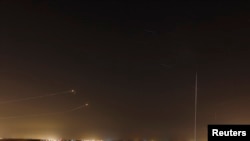New fighting erupted in Gaza Tuesday, jeopardizing Israeli-Palestinian negotiations over a lasting cease-fire in the Mediterranean enclave.
Israeli warplanes launched airstrikes against Hamas militants in Gaza after three rockets fired from Gaza landed in southern Israel.
Palestinian authorities say a woman and a 2-year-old girl were killed by an Israeli missile in Gaza Tuesday - the first deaths after a cease-fire and truce talks collapsed.
The violence came as the warring sides were holding indirect talks in Cairo in a bid to extend a temporary Gaza cease-fire into a more enduring truce.
But after the rocket fire, Israeli Prime Minister Benjamin Netanyahu ordered his negotiators to return home. A senior Hamas official said chances of securing a new agreement were "evaporating."
The U.S. State Department, long involved in trying to secure Middle East peace, said it is "very concerned" about the new fighting and blamed Hamas.
The Israeli military said the Gaza rockets landed in open fields near Beersheba and no one was injured. Later, Israel said it intercepted two more rockets the militants fired into the Jewish state.
After the first barrage of rocket attacks, Netanyahu quickly ordered the Israeli military to renew attacks on Hamas targets in Gaza. Thousands of Palestinians fled their homes in Gaza City, carrying clothes, pillows and mattresses as they headed to shelters in schools run by the United Nations.
Israeli and Palestinian negotiators had agreed late Monday to a 24-hour extension of a five-day cease-fire, with the one-day truce set to expire at midnight Tuesday.
Israeli government spokesman Mark Regev blamed Hamas for the end to nine days of relative calm in the skies over Gaza.
"Today's rocket attack on the Israeli city of Beersheba is a grave and direct violation of the cease-fire that Hamas committed to. This is the 11th cease-fire that Hamas has either rejected or violated and it's clear that a cease-fire has to be a two-way street. It's not just that Israel holds its fire. Hamas must hold its fire, too," said Regev.
The chief Palestinian negotiator, Azzam al-Ahmad, said late Monday that "the cycle of violence" would continue in the Gaza Strip if the talks did not succeed.
"We agreed to the cease-fire for just one day, just one day. Tomorrow we will agree or we will not agree. We hope to use every minute of the next 24 hours to reach an agreement, or else the cycle of violence will continue," said al-Ahmad.
The announcement of the cease-fire extension Monday came just minutes before a five-day cease-fire was set to expire.
Egyptian mediators have been conducting indirect negotiations, carrying truce proposals back and forth between the Israelis and the Palestinians. Israel has refused direct talks because the Palestinian delegation includes Hamas, which it considers a terrorist group.
The gap remains wide. Israel demands the disarming of Hamas and an end to its cross-border rocket attacks. The Palestinians are calling for the end of Israel's eight-year blockade of impoverished Gaza.
The five weeks of fighting have left more than 2,000 people dead, most of them Palestinians. It also has left Gaza neighborhoods in rubble from Israeli airstrikes. Sixty-seven Israelis have also been killed. All but three were soldiers.
Norway said if a lasting truce is reached, it will host a conference with Egypt to look for international donors to rebuild Gaza.
Some information for this report provided by Reuters, AP and AFP.





